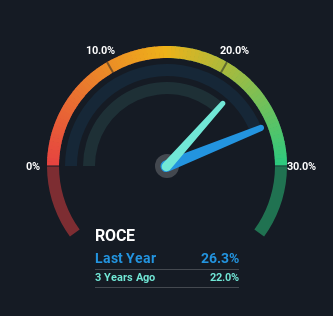- India
- /
- Trade Distributors
- /
- NSEI:VINYLINDIA
Investors Could Be Concerned With Vinyl Chemicals (India)'s (NSE:VINYLINDIA) Returns On Capital

What trends should we look for it we want to identify stocks that can multiply in value over the long term? Amongst other things, we'll want to see two things; firstly, a growing return on capital employed (ROCE) and secondly, an expansion in the company's amount of capital employed. If you see this, it typically means it's a company with a great business model and plenty of profitable reinvestment opportunities. Having said that, while the ROCE is currently high for Vinyl Chemicals (India) (NSE:VINYLINDIA), we aren't jumping out of our chairs because returns are decreasing.
Return On Capital Employed (ROCE): What Is It?
Just to clarify if you're unsure, ROCE is a metric for evaluating how much pre-tax income (in percentage terms) a company earns on the capital invested in its business. To calculate this metric for Vinyl Chemicals (India), this is the formula:
Return on Capital Employed = Earnings Before Interest and Tax (EBIT) ÷ (Total Assets - Current Liabilities)
0.26 = ₹271m ÷ (₹2.2b - ₹1.1b) (Based on the trailing twelve months to December 2023).
So, Vinyl Chemicals (India) has an ROCE of 26%. In absolute terms that's a great return and it's even better than the Trade Distributors industry average of 5.6%.
Check out our latest analysis for Vinyl Chemicals (India)

While the past is not representative of the future, it can be helpful to know how a company has performed historically, which is why we have this chart above. If you'd like to look at how Vinyl Chemicals (India) has performed in the past in other metrics, you can view this free graph of Vinyl Chemicals (India)'s past earnings, revenue and cash flow.
The Trend Of ROCE
In terms of Vinyl Chemicals (India)'s historical ROCE movements, the trend isn't fantastic. To be more specific, while the ROCE is still high, it's fallen from 37% where it was five years ago. And considering revenue has dropped while employing more capital, we'd be cautious. This could mean that the business is losing its competitive advantage or market share, because while more money is being put into ventures, it's actually producing a lower return - "less bang for their buck" per se.
On a related note, Vinyl Chemicals (India) has decreased its current liabilities to 52% of total assets. So we could link some of this to the decrease in ROCE. Effectively this means their suppliers or short-term creditors are funding less of the business, which reduces some elements of risk. Since the business is basically funding more of its operations with it's own money, you could argue this has made the business less efficient at generating ROCE. Keep in mind 52% is still pretty high, so those risks are still somewhat prevalent.
In Conclusion...
From the above analysis, we find it rather worrisome that returns on capital and sales for Vinyl Chemicals (India) have fallen, meanwhile the business is employing more capital than it was five years ago. Since the stock has skyrocketed 478% over the last five years, it looks like investors have high expectations of the stock. Regardless, we don't feel too comfortable with the fundamentals so we'd be steering clear of this stock for now.
Vinyl Chemicals (India) does have some risks though, and we've spotted 1 warning sign for Vinyl Chemicals (India) that you might be interested in.
If you'd like to see other companies earning high returns, check out our free list of companies earning high returns with solid balance sheets here.
If you're looking to trade Vinyl Chemicals (India), open an account with the lowest-cost platform trusted by professionals, Interactive Brokers.
With clients in over 200 countries and territories, and access to 160 markets, IBKR lets you trade stocks, options, futures, forex, bonds and funds from a single integrated account.
Enjoy no hidden fees, no account minimums, and FX conversion rates as low as 0.03%, far better than what most brokers offer.
Sponsored ContentNew: Manage All Your Stock Portfolios in One Place
We've created the ultimate portfolio companion for stock investors, and it's free.
• Connect an unlimited number of Portfolios and see your total in one currency
• Be alerted to new Warning Signs or Risks via email or mobile
• Track the Fair Value of your stocks
Have feedback on this article? Concerned about the content? Get in touch with us directly. Alternatively, email editorial-team (at) simplywallst.com.
This article by Simply Wall St is general in nature. We provide commentary based on historical data and analyst forecasts only using an unbiased methodology and our articles are not intended to be financial advice. It does not constitute a recommendation to buy or sell any stock, and does not take account of your objectives, or your financial situation. We aim to bring you long-term focused analysis driven by fundamental data. Note that our analysis may not factor in the latest price-sensitive company announcements or qualitative material. Simply Wall St has no position in any stocks mentioned.
About NSEI:VINYLINDIA
Flawless balance sheet established dividend payer.
Similar Companies
Market Insights
Community Narratives




